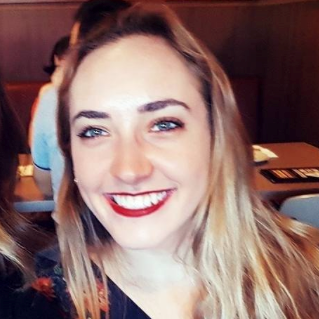
Michela Castagnone
Honours Student
21-year-old Honours (Advanced Mathematics) student Michela Castagnone got her first taste of university life as a high school student at our Girls Do the Maths workshop in 2012.
She reveals what fascinates her about maths, the highlights of her studies at UNSW, what she believes will help increase female participation in maths and her plans for life after university.
Interview conducted by School Communications Officer, Susannah Waters
You attended the Girls Do the Maths workshop here at UNSW as a high school student in 2012. What did you think of the workshop?
The workshop was a fantastic opportunity to meet people my age who also had an interest in mathematics. It was a great opportunity to gain an insight into university life, and in particular, life as a mathematics student.
Were there any particular highlights for you at the workshop?
We were given the opportunity to participate in first year lectures to gain a glimpse of what a degree in mathematics would be like. This was very enjoyable as I found I surprisingly could follow and understand content in the lectures.
What initially motivated you to pursue university studies in mathematics?
I was extremely motivated to pursue mathematics in my tertiary studies as throughout high school I had a keen interest and was a high achiever in mathematics. Additionally, I knew I would be able to apply the analytical skills that I would gain in mathematics to my other areas of interest, such as music.
You’ve just commenced Honours. Are you enjoying your studies? What has been your highlight so far?
I am very much enjoying my studies and university life. A memorable moment was in my first year during a physics lecture where a student was asked to literally stand on the lecturer who was lying on a bed of nails. This was an entertaining and practical example of the concepts we were introduced to in the course.
A more recent highlight was the opportunity I had to do a practice Honours seminar in front of my peers in preparation for my end of year seminar. Through this, I was able to discuss my thesis with lecturers and fellow students and practice my ability to accurately and concisely explain ideas that will form a part of my thesis.
Is there a particular aspect of maths that fascinates or motivates you?
In school, I was fascinated by the idea of the harmonic series, namely harmonic series in music, which is a naturally occurring phenomenon in everyday life. My keen interest in music tied together this idea and I was thrilled at the connections between my two passions.
In May this year, you helped out at our annual Girls Do the Maths workshop. What was that experience like?
Helping out at the Girls Do the Math workshop this year was a rewarding experience in which I could gain an insight into the attitudes of young girls regarding pursuing mathematics during their tertiary studies. I think that it is important to encourage young girls to pursue STEM related fields and the Girls Do the Math workshop is one such platform that promotes women in STEM.
The number of girls studying HSC maths has been declining. What do you think might make girls more interested in maths?
I think talks by women who have studied mathematics, specifically regarding how studying mathematics has shaped their career, can help young girls to understand the relevance of mathematics in their futures. Even the notion that the basic analytical skills you develop through studying mathematics can be applied to other fields of study is a way for girls to see why mathematics can be so dynamic and interesting.
Promoting female leadership is a fantastic way to improve confidence and motivation in young girls. Also, talks that demonstrate the great career prospects of a mathematics degree is one effective way to make the subject more approachable and intriguing.
When I attended the Girls Do the Math workshop we listened to a talk given by a former student who had completed a degree in Actuarial Studies and who was enjoying work life. This was a very relatable topic and young women might find such talks refreshing as perhaps young people are failing to realise the vast opportunities that can arise from a mathematics degree.
What would you say to those who are very good at mathematics, but who may be hesitant to pursue tertiary studies in maths?
In this situation, I would try to find out exactly why someone who is very good at mathematics would not consider pursuing tertiary studies in mathematics. If it were because they did not see how a mathematics degree could apply to a potential career, I would emphasise the fact that the skills gained through mathematics have vast application in the workforce. A mathematics degree can set you apart from other applicants because few people have completed a mathematics degree. Moreover, pursuing a subject that you enjoy and have an aptitude for will make your studies extremely rewarding and enjoyable.
What are your plans for after university?
I have been offered a position in the Graduate program of a top four financial institution commencing in 2018. I hope to continue to develop my programming skills in future roles in the workplace and hope to continue to pursue my hobbies in music and visual art.
---------------
June 2017
